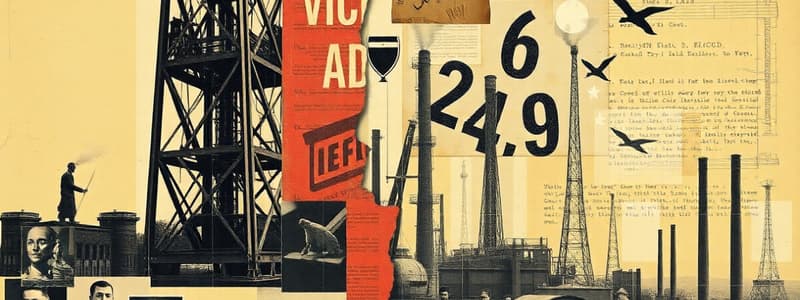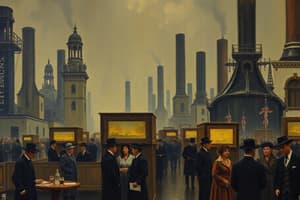Podcast
Questions and Answers
What was the name of the Supreme Court case that upheld racial segregation in public facilities?
What was the name of the Supreme Court case that upheld racial segregation in public facilities?
What is the term for the idea that people who are successful are more fit to survive and prosper, often used to justify social inequality?
What is the term for the idea that people who are successful are more fit to survive and prosper, often used to justify social inequality?
Social Darwinism
The term 'robber barons' is typically used to describe the powerful industrial leaders of the late 19th century.
The term 'robber barons' is typically used to describe the powerful industrial leaders of the late 19th century.
True
Which of the following were factors that contributed to the growth of cities during the late 19th and early 20th centuries?
Which of the following were factors that contributed to the growth of cities during the late 19th and early 20th centuries?
Signup and view all the answers
What was the primary economic philosophy that dominated the late 19th century and encouraged minimal government intervention in the economy?
What was the primary economic philosophy that dominated the late 19th century and encouraged minimal government intervention in the economy?
Signup and view all the answers
Which of the following is NOT a consequence of industrialization?
Which of the following is NOT a consequence of industrialization?
Signup and view all the answers
The Panama Canal was built entirely by American workers.
The Panama Canal was built entirely by American workers.
Signup and view all the answers
What was the name of the political philosophy that advocated for the improvement of living conditions and social justice for the working class?
What was the name of the political philosophy that advocated for the improvement of living conditions and social justice for the working class?
Signup and view all the answers
Which of the following was NOT a direct consequence of World War I?
Which of the following was NOT a direct consequence of World War I?
Signup and view all the answers
The Great Migration involved the movement of African Americans from the North to the South.
The Great Migration involved the movement of African Americans from the North to the South.
Signup and view all the answers
Study Notes
Industrialization and Laissez-Faire
- Industrialization led to monopolies, robber barons, and labor movements.
- Urbanization and tenements arose.
- Immigration saw push and pull factors.
Immigration and Race Relations
- Assimilation and nativism emerged.
- Jim Crow segregation occurred.
- Conflicts with Indian Reservations.
- Government policies (Homestead Act, Dawes Act) impacted settlers and Native Americans.
- Impacts of transcontinental railroads.
- Plessy v. Ferguson
Gilded Age
- Social Darwinism and Gospel of Wealth were prominent ideologies.
- Social movements such as the Populist Movement emerged.
Spanish-American War and Imperialism
- Causes and consequences of the war, including yellow journalism.
- Territorial acquisitions (Panama Canal, etc).
- Anti-imperialist views.
Progressivism
- Political changes and efficiency reforms.
- Reforms in businesses and worker rights.
- Consumer and environmental protections.
World War I
- Causes of American entry, and home front mobilization.
- National security versus civil liberties.
- Wilson's idealism (Fourteen Points).
Roaring Twenties
- Nativism and immigration laws, prohibition, and organized crime
- Mass production and consumerism.
- Great Migration and Harlem Renaissance.
The Great Depression
- Causes of the economic collapse.
- Hoover's response to the crisis.
- Roosevelt's New Deal and its overall impact.
Studying That Suits You
Use AI to generate personalized quizzes and flashcards to suit your learning preferences.
Related Documents
Description
This quiz covers significant events in American history from industrialization, immigration, and race relations to the Gilded Age, Spanish-American War, and World War I. Explore the impact of various reforms, ideologies, and social movements during these transformative periods. Test your knowledge of these key historical concepts and their implications.




